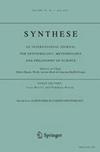On Husserl’s Twin Earth
IF 1.3
1区 哲学
Q1 HISTORY & PHILOSOPHY OF SCIENCE
引用次数: 0
Abstract
Abstract In a 1911 research manuscript, Husserl puts forth an idea that resembles Putnam’s Twin Earth thought experiment presented in the 1970s. In this paper, I study Husserl’s “Twin Earth” passage and assess various readings of it to determine whether Husserl is better understood as an internalist or an externalist. I define internalism as the view that content depends solely on internal factors to the subject, whereas I distinguish between two versions of externalism: weak externalism, according to which content can also depend on other subjects’ conceptions, and strong externalism, which maintains that content can also depend on the real world. Only strong externalism maintains what McGinn calls “the philosophical significance of externalism” because it entails realism about the world. I argue that Husserl is better understood as an externalist when it comes to the “Twin Earth” passage, but the more precise question regarding weak and strong externalism requires further evidence. This additional evidence concerns Husserl’s concepts of the identity of sense (Sinnesidentität) and worldly meaning (weltlicher Sinn). In evaluating externalist Husserl interpretations, I classify Smith’s externalist interpretation as weak, whereas I take Crowell’s externalist interpretation to be ambivalent. Crowell’s excellent but somewhat embryonic interpretation leaves the dependence relation between content and the real world ambiguous. I clarify this relation by assessing McGinn’s argument for the philosophical significance of externalism from the Husserlian viewpoint. Although this study is historical, it also serves a systematic purpose because the externalist interpretation of Husserl calls into question central issues in phenomenology and externalism.论胡塞尔的孪生地球
在1911年的一份研究手稿中,胡塞尔提出了一个类似于20世纪70年代帕特南提出的“孪生地球”思想实验的想法。在本文中,我研究了胡塞尔的“双生地球”段落,并评估了对它的各种解读,以确定胡塞尔是作为一个内在主义者还是一个外在主义者更好地被理解。我将内部主义定义为内容完全取决于主体的内部因素的观点,而我区分了两种版本的外部主义:弱外部主义,根据这种观点,内容也可以依赖于其他主体的概念,强外部主义,认为内容也可以依赖于现实世界。只有强烈的外在主义才能维持McGinn所说的“外在主义的哲学意义”,因为它包含了关于世界的现实主义。我认为,当谈到“孪生地球”这一段时,胡塞尔被更好地理解为一个外在主义者,但关于弱和强外在主义的更精确的问题需要进一步的证据。这一额外的证据涉及胡塞尔关于感觉同一性(Sinnesidentität)和世俗意义(weltlicher Sinn)的概念。在评价胡塞尔的外在主义解释时,我认为史密斯的外在主义解释是软弱的,而我认为克罗威尔的外在主义解释是矛盾的。克罗威尔出色但有些不成熟的解释使内容与现实世界之间的依赖关系模糊不清。我从胡塞尔的观点出发,通过评价麦克金关于外在主义的哲学意义的论证,来澄清这种关系。虽然这项研究是历史性的,但它也有系统的目的,因为胡塞尔的外在主义解释提出了现象学和外在主义的核心问题。
本文章由计算机程序翻译,如有差异,请以英文原文为准。
求助全文
约1分钟内获得全文
求助全文
来源期刊

Synthese
管理科学-科学史与科学哲学
CiteScore
3.30
自引率
13.30%
发文量
471
审稿时长
1 months
期刊介绍:
Synthese is a philosophy journal focusing on contemporary issues in epistemology, philosophy of science, and related fields. More specifically, we divide our areas of interest into four groups: (1) epistemology, methodology, and philosophy of science, all broadly understood. (2) The foundations of logic and mathematics, where ‘logic’, ‘mathematics’, and ‘foundations’ are all broadly understood. (3) Formal methods in philosophy, including methods connecting philosophy to other academic fields. (4) Issues in ethics and the history and sociology of logic, mathematics, and science that contribute to the contemporary studies Synthese focuses on, as described in (1)-(3) above.
 求助内容:
求助内容: 应助结果提醒方式:
应助结果提醒方式:


